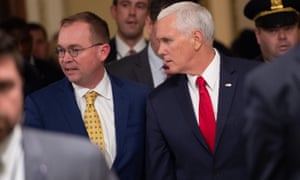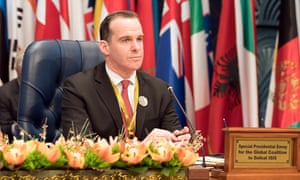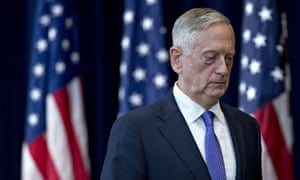Extract from The Guardian
- In act of payback, Trump brings departure forward to 1 January
- Deputy Patrick Shanahan named in acting Pentgaon role
Donald Trump
is forcing defense secretary Jim Mattis to step down on 1 January, two
months before his agreed departure, in open payback for the former
Marine general’s public rebuke of the president’s decision abruptly to
withdraw troops from Syria.
Trump issued the bombshell news in characteristic fashion: in a tweet.
He announced on Sunday morning that Patrick Shanahan, the current
deputy at the Pentagon, would step up at the start of the New Year. The
president lauded his temporary pick to run the world’s largest military
force as a man with a “long list of accomplishments”.But the move came across as an act of sour grapes in response to Mattis’s disclosure of his deep disapproval of Trump’s approach to foreign policy. In his resignation letter, the defense secretary talked of the importance of working with allies and warned of the threat of “malign actors” like China and Russia.
The sudden jolt to the Department of Defense adds to the sense of meltdown that has descended on the White House as it enters Christmas week. Even for a president who has elevated chaos and confusion into a political art form, Trump goes into the holiday in dazzlingly shambolic form.
The stock market is on track to finish the worst month since the 1930s; Mattis and the US envoy in the fight against Islamic State, Brett McGurk, have resigned publicly, expressing their disdain for Trump; and a multitude of investigations including the special counsel Robert Mueller’s work on potential collusion with Russia appear to be closing in. This week saw the shuttering of Trump’s charitable foundation.
"If he has to fight against the defense department he’s going to do that. The people who voted for him like it"
Even the national Christmas tree, of which Trump has a fine view from the White House, will be dark throughout the week as a result of a partial shutdown of the federal government that is of his own making. The shutdown, which since Saturday has seen 380,000 federal workers stuck at home without pay and a further 420,000 essentially working for free, will last at least until Thursday.
The White House response to the rapidly mounting sense of disarray was to put up Mick Mulvaney, Trump’s new acting chief of staff, as the face of reason on the Sunday political shows. If the move was designed to calm jitters, it backfired spectacularly.
Mulvaney told Fox News Sunday that the shutdown could extend beyond the New Year, into the era of Democratic control of the House of Representatives that begins on 3 January. He said the White House had made a new offer of somewhere between $1.6bn and $5bn to go towards the costs of building Trump’s border wall with Mexico.
But with the Democrats indicating they would agree to no more than $1.3bn – none of which would go towards the wall, which they regard as unjustifiable – the prospects of a resolution looked bleak.
Mulvaney also did nothing to dispel the vision of a president increasingly acting of his own volition, unconcerned about advice from top officials and focused only on one thing: pleasing his hardcore support.

Asked by CNN’s State of the Union why Trump had decided to pull US troops out of Syria against the counsel of all his main advisers – including Mattis, McGurk, secretary of state Mike Pompeo and John Bolton, the national security adviser – Mulvaney replied: “He’s been telling people he was going to do this since the beginning, and if he has to fight against the defense department to do that he’s going to do that. It may have upset a lot of people, but the people who voted for him like it.”
The Syria withdrawal shocked even hardened observers of Trump’s mercurial style and has led to an unprecedented array of senior Republicans speaking out against him. Mitch McConnell, the Republican leader of the Senate, broke his normal reticence towards the president by saying he was “distressed” by Mattis’s resignation.
Leading Republican senators including Lindsey Graham, one of Trump’s most loyal supporters, Marco Rubio and others have called the withdrawal a disaster and a “costly mistake”. The most chilling analysis of what was happening within the White House was given by Bob Corker of Tennessee, one of few top Republicans who have been prepared to question Trump but who is standing down from the Senate next month.
Corker told CNN he had noticed a change in Trump’s approach to power, three or four months ago.
Corker’s vision of an unleashed president unrestricted by counsel would lead, he said, to a decisive next three months. At its most dramatic, Trump could even decide not to stand for re-election in 2020.
“These next three months could decide whether he runs again or not. I think the stage is going to be set,” Corker said.
On Syria, Corker, chairman of the Senate foreign relations committee, said he was “devastated”. On the shutdown he went even further, calling it a “made-up fight so that the president can look like he’s fighting … This is unnecessary, it is a spectacle, and candidly it is puerile. The whole thing is puerile.”
Mattis’s departure will leave Trump without the benefit of one of the triumvirate of advisers who were often described as the “adults in the room”. Rex Tillerson was sacked as secretary of state in March in a Trump tweet, chief of staff John Kelly will be out by the end of the year, and now Mattis will make a swift departure too.
In the veteran reporter Bob Woodward’s bestselling book, Fear, Mattis is depicted quietly blocking a suggestion that the US should assassinate the Syrian president, Bashar al-Assad. He is also reported to have said that in foreign affairs, Trump shows the understanding of a 10- or 11-year-old child. Mattis denied Woodward’s claims but the Washington Post writer stood by his work.

He similarly denigrated McGurk, the envoy in the fight against Isis, suggesting he was a “grandstander”. Trump added that he did not know McGurk before the envoy quit on Saturday, telling his staff the decision to withdraw from Syria came as a shock and “left our coalition partners confused and our fighting partners bewildered”.
Mulvaney was asked by ABC’s This Week whether the president should have known his senior envoy on Isis. The incoming chief of staff replied: “I had no idea who that person was until yesterday.”
Mulvaney went on to mimic Trump’s putdown of McGurk, saying the envoy was “an Obama appointee who saw an opportunity”. Though McGurk was given the Isis job by Obama, he also served the Republican president George W Bush in a number of senior diplomatic roles.
Among US allies in Europe and elsewhere, Mattis’s resignation produced widespread alarm. It was reportedly prompted by the general’s anger over Trump’s sudden decision to acquiesce to the wishes of the Turkish president, Recep Tayyip Erdoğan, who is openly hostile to the America’s Kurdish allies in Syria.
On Sunday, after announcing Mattis’s early departure, Trump tweeted that he had “just had a long and productive call” with Erdoğan.
“We discussed Isis, our mutual involvement in Syria, & the slow & highly coordinated pullout of US troops from the area,” he wrote. “After many years they are coming home. We also discussed heavily expanded trade.”
The Turkish presidency said the two leaders had agreed to coordinate to prevent an authority vacuum after the US withdrawal. It also sent troops towards Manbij, a Kurdish-held town in Syria.

No comments:
Post a Comment